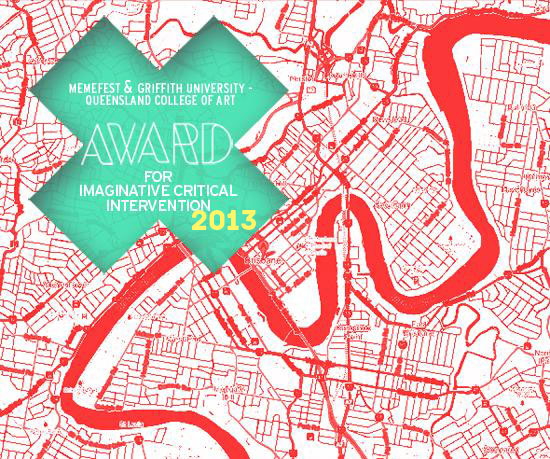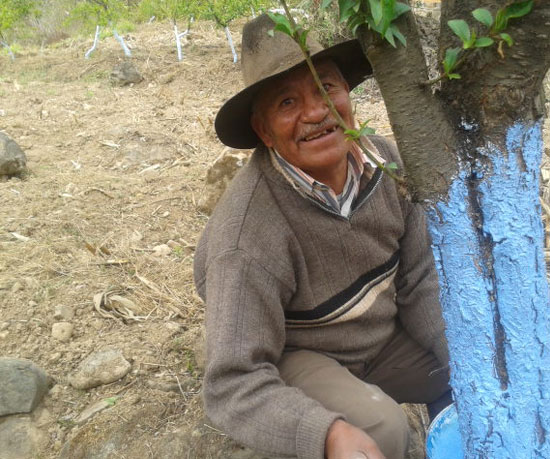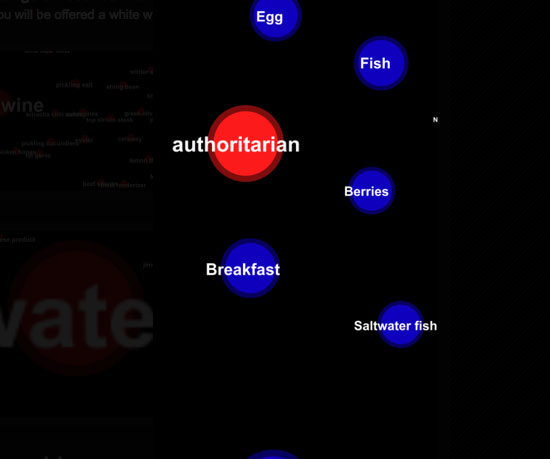Harvest- the Memefest/QCA Award

After our Friendly Competition results, here our second harvest this year, again, with fantastic outcomes.
We are excited to announce this years special Memefest/ Queensland College of Art- Griffith University Award for Imaginative Critical Intervention.
The award for Imaginative Critical Intervention is given to support critical thinking, as the ability to see situations as they are and imagine them differently in a way that can emancipate and lead to transformation through intervention. Such interventions can be many things. They create a rupture in the order of things with the goal to redefine our relationships between being, doing and saying and our fields of experience. Such interventions conditioned by critical thinking are tightly connected to the principle of response-ability, which is an active position of engagement and the quality to transformatively act in situations, insisting that what matters are the human implications and not only the market implications of situations.
Curated by Dr George Petelin and Dr Oliver Vodeb, the receivers of the award that will be invited to Brisbane- Australia to take part in our in residence program are:
I. Mohammad Naser (Bangladesh) for his work Seeds of Hope/Destruction in which he deals with the core of Food Democracy and life itself- the seed. He examines the relation between bio-engineered seeds and the people that are affected by them. Focusing on Bangladesh and mostly on the farmers, Mohammad produces a compelling narrative that touches many of the problems related to hybrid seeds: destruction of biodiversity, enslavement of farmers through debt and destruction of the environment. The award is given for his work submitted:
http://www.memefest.org/en/gallery/works2013/1378/
and for his photographic work related to it:
http://www.lightstalkers.org/galleries/slideshow/32894
II. Eugenio Tisselli, Odilón Martínez and Families in Tlahuitoltepec (Mexico) for the work Los ojos de la milpa (The eyes of the milpa). "Throughout a crop-growing cycle, families from the Juquila and Santa Ana ranches use smartphones to capture images and record sounds of whatever happens in their milpas, and to post them on a special website. By doing this, they share their knowledge, their concerns, their ways of doing and their ways of thinking. They make themselves present by presenting their stories to us, by showing us how they live and work in a community which resists as it transforms. Through their own words and points of view, they leave a testimony of a crucial moment in which the urgency of finding a balance between nature and technology, between culture and productivity, can be felt."
Los ojos de la milpa is a wonderful project that connects ancient knowledge about nature with a reflection of current times and its pressures through dialogic pedagogy. It's tactical media context not only translates deep localities to the wider world but emancipates knowledge that is under attack even in the very remote regions of Mexico.
The award is given for the importance of the work and the following quality: Respect. In the words of the author, the work is good: "Because it is respectful: it respects the farmers' voices and opinions by not filtering or distorting them. It presents their views, their concerns, their ways. The project also respects their language, as every effort was made to translate and transcribe their words spoken in Mixe. Finally, it is good work because the web interface and the mobile app were designed to be as simple as possible, allowing even non-expert users to access them."
http://www.memefest.org/en/gallery/works2013/1100/
III. Miha Mazzini and Marko Plahuta (Slovenia) for the work Eat for Democracy!
The authors playfully walk on a very fine line between humor, science, politics and cultural analysis. Taking information from knowledge basis: all of the recipes from Food.com and democracy indexes of The Economist and Wikipedia; they linked national cooking recipes with the countries, split recipes into ingredients and added democracy indexes to them.
Now, how democratic is Pizza? How democratic is garlic, salt or milk? Or pesto sauce? Yeah, there is a difference of the food eaten in Democratic, troubled or authoritarian countries and the ingredients of food mirror democracy too. In the words of the authors;" How can one quickly distinguish between "troubled" and "good" country? In the "troubled" country you will be offered a white wine, while in a "good" country you'll get only water (but a lot of it)."
So, either you eat Hot dogs for breakfast of drink beetroot juice not only you might do that in a particular political climate more than in another but you also will support or oppose a political system with your eating choices. The award is given for the original approach, humor and imaginary potential.
http://www.memefest.org/en/gallery/works2013/1367/
--Honorary mention: Mariano Mussi (Argentina) for his work The Hidden Sacrifice. Mariano writes about the invisible relation between food, life, death and the predatory spectacle of the market. What is important appears, what appears is important. Death and our relationship to animal death is designed unimportant- with purpose. This is about disconnecting us from nature. That food and the food system are designed in this way shows our profound mistake as food is our most intimate relation to nature. Death, love, blood, life as an intervention?
http://www.memefest.org/en/gallery/works2013/1104/
Our warmest congratulations to all authors!!
Have a look at what exactly were the festival outlines here: http://www.memefest.org/en/competition/intro/
And have a look at the main Friendly competition results here: http://www.memefest.org/en/gallery/works2013/
The in residence program is structured around a direct collaboration with QCA academics Dr George Petelin and Dr Oliver Vodeb, together with all three recipients of the Award, and other mentors from areas of design (http://designfutures.com.au/) and communication studies as well as with experts and activists engaged in to Food Democracy. The intensive extradisciplinary workshop will take place between November 4th and November 11th.
Besides international receivers of the Memefest/QCA award we will invite also:
I. Queensland College of Art students whose submitted works have been curated in this years Friendly competition;
II. Members of local Brisbane community who have submitted works we liked a lot or are/have been involved in non institutionalised Memefest related activities;
The Workshop will take place at the Queensland College of Art (http://www.qcagriffith.com/) and other places in Brisbane. We will work on further extradisciplinary interrogation of this years festival theme - FOOD DEMOCRACY, with the aim to critically intervene in Brisbane’s public space.
It is great to see how our growing community is contributing to the local Brisbane scene and is together with local actors planting seeds of socially responsive communication design, art and pedagogy for social and environmental change.
More soon.



Comments
11 years, 9 months

To comment, please create a Memefest account, it will take you only 2 minutes! Login here if you already have one.